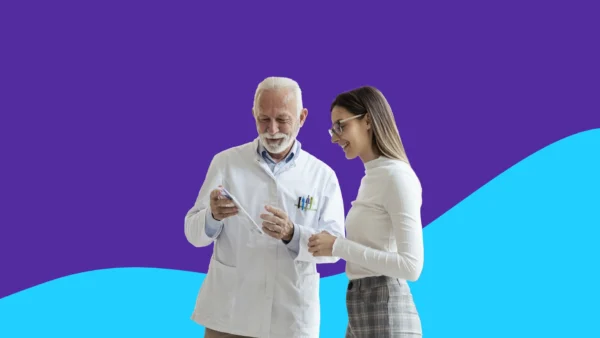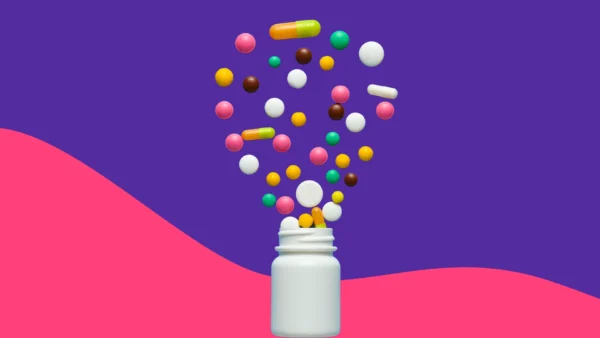How long does it take to become a pharmacist? | Pharmacist education requirements | Required skills | Job prospects | Resources
A career as a pharmacist can be rewarding and allow you to make an impact on the health of your community. As a pharmacist, you’ll be in charge of looking over patient medications and making sure they are dosed correctly. You’ll guide patients on how to take their medications and educate them on possible side effects or drug interactions. You might even act as a coach to ensure your patients are taking their medications every day and leading healthy lives with a good diet and enough exercise. Pharmacy might be the career you’re looking to pursue. But, how long does it take to become a pharmacist? Continue reading to learn how long it takes and what it takes to become a pharmacist.
How long does it take to become a pharmacist?
It can take six to eight years to become a pharmacist after graduating from high school. However, it can take longer if you wish to specialize in a specific area of pharmacy. For example, you may need to take on an extra year or two of residency to work as a clinical or hospital pharmacist. Other factors can also play into how long it takes to become a pharmacist.
Pharmacist educational requirements
How long it takes to become a pharmacist depends on what educational track you pursue. If you have your sights set on becoming a pharmacist, you can fast-track your pharmacy education right out of high school. You can undertake a six-year Pharm.D. (Doctor of Pharmacy) program that typically includes pre-pharmacy studies and professional pharmacy coursework.
It can take eight years of college to become a pharmacist after high school if you decide to get a four-year bachelor’s degree before applying to a four-year Pharm.D. program. In general, completing a pharmacy degree in six years is more intense than completing it in eight years.
1. Complete pre-pharmacy requirements
Pharmacy schools don’t require that you have a particular undergraduate degree. However, many schools require that you take relevant coursework to prepare you for a career in pharmacy. Pharmacy school prerequisite courses may include biochemistry, calculus, and anatomy, among others. People who pursue a pre-med or pre-pharmacy track are often well-prepared to tackle pharmacy school. If you have any doubts, you can also talk to your school’s academic adviser for guidance.
Time it takes: Two to four years of undergraduate study
2. Apply for pharmacy school
If you’re researching potential pharmacy schools to attend, you should make sure that the school is accredited by the Accreditation Council for Pharmacy Education (ACPE). Some pharmacy schools will require the Pharmacy College Admission Test (PCAT) to enter their program while others consider it optional. In some cases, your PCAT score can help bolster your application.
After submitting your application, the school of pharmacy may call you for an interview. They may also ask you why you chose to pursue pharmacy and whether you have any relevant volunteer or work experience in a pharmacy.
3. Complete pharmacy school
Pharmacy degree programs include a mix of didactic and experiential learning. In other words, you’ll learn the foundations of pharmacy in a classroom setting and then apply what you learned through practical experiences in a real pharmacy. Those hours spent in that experiential, practical setting can count towards the clinical internship hours required to receive a license from the state board. Pharmacy programs can be rigorous, and they typically include classes like pharmacology, pharmacotherapy, and pharmacokinetics. After completion of the program, you’ll earn your Pharm.D., Doctor of Pharmacy degree.
Time it takes: Four years of postgraduate study, including 1,500 hours of clinical internship
4. Get licensed as a pharmacist
To be a licensed pharmacist in the U.S., you’ll have to complete requirements as determined by your state. Requirements may include:
- A Pharm.D. degree from a school accredited by the ACPE
- Completion of a certain number of clinical internship hours (usually around 1,500 hours)
- Passing scores on the North American Pharmacist Licensure Exam (NAPLEX)
- Passing scores on the Multistate Pharmacy Jurisprudence Exam (MPJE) or other state pharmacy law exam
- For graduates of international pharmacy schools, passing scores on the Foreign Pharmacy Graduate Equivalency Examination (FPGEC)
These requirements can vary depending on the state you’re planning to get licensed and work in.
5. Additional training for pharmacists
Most people think of a retail pharmacy when they hear about pharmacy. They might think of a pharmacist counting pills all day and dealing with insurance companies. But there are many other options. You might decide to be a clinical pharmacist who works closely with other healthcare professionals in a hospital environment. You might choose to work in oncology to monitor the use of specific drugs in cancer patients. You might be interested in compounding specialty drugs as a compound pharmacist or dealing with radioactive materials as a nuclear pharmacist.
If you decide you want to work in a hospital or other specialized environment, you may need additional training. For example, to become a hospital pharmacist, you may need to do an extra one to two years of a residency program after graduating. If you’re interested in research or the pharmaceutical industry, you would apply for one to two years of specialized training called a fellowship after pharmacy school. In total, for people who want to specialize, it can take eight to 10 years to become a pharmacist.
Time it takes: One to two years of residency or fellowship
6. After getting licensed
Your pharmacy education doesn’t stop after you’ve become licensed. State pharmacy boards generally require you to complete a minimum number of hours of continuing education (CE) to keep your state license. Most states require at least 30 hours of approved CE credits every renewal period, which is every two years.
Time it takes: At least 30 hours of continuing education every two years
What skills do you need to become a pharmacist?
Working as a pharmacist is not always simple. For that reason, a particular breed of person thrives in a pharmacy environment. The following skills can be more helpful than others while pursuing a career as a pharmacist.
Attention to detail
Reviewing and dispensing medications require a high level of accuracy and precision. The number one priority in pharmacy is making sure medications are safe to take for patients. Pharmacists should have attention to detail while working with over-the-counter and prescription medications.
Communication
As a pharmacist, you’ll be interacting with patients or healthcare providers on a daily basis. Pharmacists are often the ones instructing patients on how to use their medications or educating physicians on potential drug problems. Communication and interpersonal skills are vital for educating effectively.
Critical thinking
You may be faced with difficult problems on whether to recommend a certain drug based on the overall picture of the patient. While there are guidelines for drug therapy, many treatments need to be personalized after looking at their medical history and other medications they may be taking.
Management
When you become a pharmacist, you’ll be part of a pharmacy team with pharmacy technicians helping you with your daily tasks. You’ll have to be able to lead, manage, and delegate the right tasks to the right team members. You may also be working with students or interns who will look up to you as a mentor or guide. Leadership and management skills are important as a pharmacist.
Multitasking
You may have to handle different tasks throughout the day, including educating patients, speaking with healthcare providers, running patient screenings or vaccinations, and taking care of insurance problems. Multitasking and organization skills are important for a successful pharmacy career.
The skills you need to become a pharmacist will ultimately depend on which environment you plan to work in. You might need more of one particular skill in certain areas of pharmacy, such as a hospital or community pharmacy. For example, if you want to become a hospital pharmacy director, you’ll need to sharpen your leadership skills. If you want to become a nuclear pharmacist, you might need to work on your attention to detail and chemistry knowledge as you’ll be dealing with radioactive materials.
What are the job prospects for pharmacists?
According to a report from the U.S. Bureau of Labor Statistics (BLS), the employment of pharmacists is expected to decline by 2% from 2020 to 2030. Around 11,300 pharmacist jobs are projected to be available each year to replace pharmacists who transfer workplaces or retire. The median annual wage for pharmacists is $128,710.
There’s no doubt that pharmacy is becoming a competitive field. You can boost your job prospects by excelling throughout pharmacy school and networking with potential employers. Many retail pharmacies, hospitals, and other organizations hire pharmacy students as interns, which can increase your chances of being hired as a pharmacist after graduating.
As the population ages, the need for dispensing medications remains critical and warrants a need for drug experts like pharmacists. If you have an interest or passion in pharmacy, working as a pharmacist can be a fulfilling career.
How can I learn more about becoming a pharmacist?
If you want to learn more about how to become a pharmacist, there are several resources and organizations you can turn to. Here are some tips to find more information.
Use your school’s resources
Your time in high school or university is a time to explore potential career paths. Enroll in high-level classes like organic chemistry to see if you have an interest in the field of pharmacy. If your high school or university has a pharmacy club or organization, join them. Seek guidance from your peers and academic counselors, especially if you’re torn between other career paths.
Contact prospective pharmacy schools
You should research the pharmacy schools that fit your interests and goals. PharmCAS provides a complete directory of pharmacy schools in the United States. You can organize the list based on things like location, accreditation status, and program structure. You can directly reach out to the Pharm.D. programs for more information.
Connect with pharmacists and pharmacy students
The best way to understand where you might see yourself working is to talk to someone who is already there. Shadow your local pharmacist or ask questions to get a feel for what they do on a daily basis. You can also contact pharmacy students and ask questions about their pharmacy degree program. Many pharmacists and pharmacy students would be happy to mentor you and give advice. All you have to do is ask.
If pharmacy is right for you
The path to becoming a licensed pharmacist can be long and difficult. Although advancements in new technology and drug knowledge continue to develop and change the pharmacy landscape, jobs in pharmacy are here to stay.
If pharmacy is right for you, you can expect to dedicate six to eight years or more to complete a degree in pharmacy. Doing your research and being prepared for a career in pharmacy can help set you up for success.











